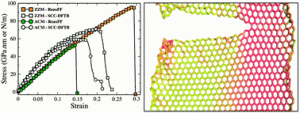1.
E. Perim T. Botari, P. A. S. Autreto
Mechanical properties and fracture dynamics of silicene membranes Journal Article
Em: Phys. Chem. Chem. Phys., vol. 16, pp. 19417–19423, 2014.
@article{t2014mechanical,
title = {Mechanical properties and fracture dynamics of silicene membranes},
author = {T. Botari, E. Perim, P. A. S. Autreto, A. C. T. van Duin, R. Paupitz, D. S. Galvao},
url = {http://pubs.rsc.org/en/Content/ArticleLanding/2014/CP/C4CP02902J#!divAbstract},
year = {2014},
date = {2014-01-01},
journal = {Phys. Chem. Chem. Phys.},
volume = {16},
pages = {19417--19423},
abstract = {As graphene has become one of the most important materials, there is renewed interest in other similar structures. One example is silicene, the silicon analogue of graphene. It shares some of the remarkable graphene properties, such as the Dirac cone, but presents some distinct ones, such as a pronounced structural buckling. We have investigated, through density functional based tight-binding (DFTB), as well as reactive molecular dynamics (using ReaxFF), the mechanical properties of suspended single-layer silicene. We calculated the elastic constants, analyzed the fracture patterns and edge reconstructions. We also addressed the stress distributions, unbuckling mechanisms and the fracture dependence on the temperature. We analysed the differences due to distinct edge morphologies, namely zigzag and armchair.},
keywords = {},
pubstate = {published},
tppubtype = {article}
}
As graphene has become one of the most important materials, there is renewed interest in other similar structures. One example is silicene, the silicon analogue of graphene. It shares some of the remarkable graphene properties, such as the Dirac cone, but presents some distinct ones, such as a pronounced structural buckling. We have investigated, through density functional based tight-binding (DFTB), as well as reactive molecular dynamics (using ReaxFF), the mechanical properties of suspended single-layer silicene. We calculated the elastic constants, analyzed the fracture patterns and edge reconstructions. We also addressed the stress distributions, unbuckling mechanisms and the fracture dependence on the temperature. We analysed the differences due to distinct edge morphologies, namely zigzag and armchair.
2014
1.

E. Perim T. Botari, P. A. S. Autreto
Mechanical properties and fracture dynamics of silicene membranes Journal Article
Em: Phys. Chem. Chem. Phys., vol. 16, pp. 19417–19423, 2014.
Resumo | Links | BibTeX | Tags: mechanical properties, molecular dynamics, silicene
@article{t2014mechanical,
title = {Mechanical properties and fracture dynamics of silicene membranes},
author = {T. Botari, E. Perim, P. A. S. Autreto, A. C. T. van Duin, R. Paupitz, D. S. Galvao},
url = {http://pubs.rsc.org/en/Content/ArticleLanding/2014/CP/C4CP02902J#!divAbstract},
year = {2014},
date = {2014-01-01},
journal = {Phys. Chem. Chem. Phys.},
volume = {16},
pages = {19417--19423},
abstract = {As graphene has become one of the most important materials, there is renewed interest in other similar structures. One example is silicene, the silicon analogue of graphene. It shares some of the remarkable graphene properties, such as the Dirac cone, but presents some distinct ones, such as a pronounced structural buckling. We have investigated, through density functional based tight-binding (DFTB), as well as reactive molecular dynamics (using ReaxFF), the mechanical properties of suspended single-layer silicene. We calculated the elastic constants, analyzed the fracture patterns and edge reconstructions. We also addressed the stress distributions, unbuckling mechanisms and the fracture dependence on the temperature. We analysed the differences due to distinct edge morphologies, namely zigzag and armchair.},
keywords = {mechanical properties, molecular dynamics, silicene},
pubstate = {published},
tppubtype = {article}
}
As graphene has become one of the most important materials, there is renewed interest in other similar structures. One example is silicene, the silicon analogue of graphene. It shares some of the remarkable graphene properties, such as the Dirac cone, but presents some distinct ones, such as a pronounced structural buckling. We have investigated, through density functional based tight-binding (DFTB), as well as reactive molecular dynamics (using ReaxFF), the mechanical properties of suspended single-layer silicene. We calculated the elastic constants, analyzed the fracture patterns and edge reconstructions. We also addressed the stress distributions, unbuckling mechanisms and the fracture dependence on the temperature. We analysed the differences due to distinct edge morphologies, namely zigzag and armchair.


